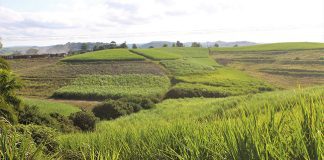
Photo: Sybil Visagie
The marathon drought in the Northern and Eastern Cape is escalating into a humanitarian crisis.
The western part of the Eastern Cape and adjacent parts of the Northern Cape have been suffering from drought for at least the past seven years and farmers are in the depths of despair, according to Doug Stern, Agri Eastern Cape president.
He said that many livestock, citrus and vegetable producers in the Eastern Cape were in dire straits. Their financial reserves were depleted and flocks cut to the bare minimum, with countless farms being put up as collateral for bank loans.
READ 9 lessons we can learn from the drought
“I don’t know what’s going to happen in the long term. The South African agriculture sector cannot afford to lose farmers of this calibre,” Stern added.
At the time of going to print, the water level of the Kouga Dam stood at 4%, the lowest since the dam was built in the late 1960s.
This posed a serious threat to citrus production in the Gamtoos Valley, according to Stern. While an excellent citrus crop was being harvested at the moment, producers were extremely concerned about the production season starting in August.
Without sufficient irrigation, production would be severely compromised, trees could be lost and hundreds of job opportunities put on the line.
READ Rebuilding a livestock enterprise after a drought
Stern said drought-stricken farmers had been caught in a perfect storm. Drastically reduced sheep flocks, coupled with the drop in wool prices, had made the disaster even worse.
“[Farmers’] cash flow was eroded long ago and they try their best to survive from day to day. Many can’t afford to keep their children in school and have reverted to homeschooling. Many of them struggle to afford basic daily necessities and large numbers of workers have had to be laid off,” Stern said.
Sybil Visagie, convenor of the Save the Sheep drought relief organisation, described a similar situation in the drought-stricken areas of Boesmanland, Namaqualand and Karoo regions of the Northern Cape. She said the effects of the drought were far-reaching.
“It doesn’t only [deplete] financial reserves and profits, but also corrodes psychological reserves and emotional resilience.
“This isn’t limited to the farming communities; it affects everybody in the drought-stricken areas, including businesses, schools, churches and old-age homes, and obviously the large number of farmworkers who have lost their jobs.”











